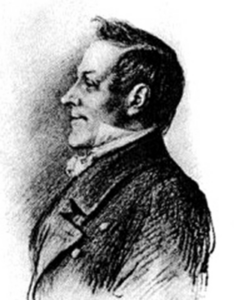The Alpine hunter
(Poet's title: Der Alpenjäger)
Set by Schubert:
D 524
[January 1817]
Auf hohen Bergesrücken,
Wo frischer alles grünt,
Ins Land hinab zu blicken,
Das nebelleicht zerrinnt,
Erfreut den Alpenjäger.
Je steiler und je schräger
Die Pfade sich verwinden,
Je mehr Gefahr aus Schlünden,
So freier schlägt die Brust.
Er ist der fernen Lieben,
Die ihm daheim geblieben,
Sich seliger bewusst.
Und ist er nun am Ziele,
So drängt sich in der Stille
Ein süßes Bild ihm vor;
Der Sonne goldne Strahlen,
Sie weben und sie malen,
Die er im Tal erkor.
Going onto the high mountain ridge,
Where everything becomes fresher and turns green,
Looking back down into the countryside
(As it fades in vague mist)
Is what the Alpine hunter enjoys.
The steeper and the more twisting
The paths become as they disappear,
The greater the risk of [falling into] gorges,
The freer beats [his heart in] his breast.
The distant beloved,
Who is waiting for him at home,
He becomes more contentedly aware of her.
And when he now reaches his destination:
In the silence he feels the pressure
Of a sweet image in front of him;
The golden rays of the sun
Weave and paint
Her, the person he chose in the valley.
All translations into English that appear on this website, unless otherwise stated, are by Malcolm Wren. You are free to use them on condition that you acknowledge Malcolm Wren as the translator and schubertsong.uk as the source. Unless otherwise stated, the comments and essays that appear after the texts and translations are by Malcolm Wren and are © Copyright.
☙
Themes and images in this text:
Abysses, clefts and crevasses Chest / breast Climbing Fading and losing colour Gold Green Hearts High, low and deep Hills and mountains Hunters and hunting Mist and fog Mountains and cliffs Noise and silence Paths Pictures and paintings Rays of light The sun Sweetness Valleys Weaving
High up on a mountain ridge a man is out hunting (presumably in the American rather than the British sense of the word – he is on his own and presumably has a gun rather than a pack of hounds), but what is his prey? There is no reference to following any tracks or stalking any specific beast. He is driven up there for other reasons. He feels increasingly liberated the higher he climbs and the more precipitous the potential fall. His heart beats faster as he rises above the concerns of the world below. He looks back down and his home environment fades in the mist. Paradoxically this allows his vision to clear.
At a point of stillness that represents his destination or goal (the word ‘Ziel’ also refers to a ‘target’ in the context of shooting) he becomes increasingly and contentedly aware of the beloved. Optical effects resulting from his dislocation allow him to see the image of the person he has left behind down in the valley. As a result of his climbing away from her and her world (which has now faded in the mist) he is granted a clearer vision of who she is. We are left wondering if he is conscious that what he sees is a trick of the light or whether he is convinced that his distancing himself from her has allowed him to understand her better. Is he deluding himself in trying to create an ideal image that does not need to correspond to the ‘lower’ reality down in the valley bottom?
If pushed, Mayrhofer might have explained the imagery in terms of Platonic philosophy and the need for human love to rise above the physical to a more spiritual, a ‘higher’ realm, a domain that would outlast the decay and mortality of the earth. Recent writers are more likely to read the image of the escaping huntsman in autobiographical terms, though. It is known that the poet was unhappy in his skin, partly because his own erotic desires did not conform to the heterosexual norms of reactionary, Catholic Austria. He was not the only young man who felt that he had to construct an idealised image of a woman whom he could love without having to deal with an actual down-to-earth, physical girlfriend or wife.
☙
Original Spelling and notes on the text Der Alpenjäger Auf hohen1 Bergesrücken, Wo frischer Alles grünt, In's Land hinab zu blicken, Das nebelleicht zerrinnt - Erfreut den Alpenjäger. Je steiler und je schräger Die Pfade sich verwinden, Je mehr Gefahr aus Schlünden, So freyer schlägt die Brust. Er ist der fernen Lieben, Die ihm daheim geblieben, Sich seliger bewußt. Und ist er nun am Ziele: So drängt sich in der Stille Ein süßes Bild ihm vor2; Der Sonne goldne Strahlen, Sie weben und sie mahlen, Die er im Thal erkor. 1 Schubert changed 'Auf hohem' to 'Auf hohen' (Movement 'onto', rather than location 'on'). 2 Schubert changed "Ein süßes Bildniß vor" to " Ein süßes Bild ihm vor" (stressing that the image appeared in front of him)
Confirmed by Peter Rastl with Gedichte von Johann Mayrhofer. Wien. Bey Friedrich Volke. 1824, page 107.
To see an early edition of the text, go to page 107 [121 von 212] here: http://digital.onb.ac.at/OnbViewer/viewer.faces?doc=ABO_%2BZ177450902


